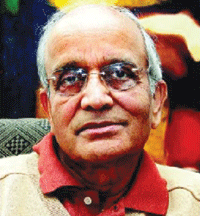Autar Nehru interviewed R.C. Bhargava, head of the third IIM Review Committee and chairman of Maruti Suzuki India Ltd, in New Delhi. Excerpts:
 The recommendations of the IIM Review Committee have evoked lukewarm response in academic circles. What is the central thrust of your recommendations?
The recommendations of the IIM Review Committee have evoked lukewarm response in academic circles. What is the central thrust of your recommendations?
There has been a certain amount of criticism of the recommendations, but that was only to be expected. We were given a job to do and the committee did its best in the interest of the future growth of the institutes. The committee has pointed out areas where the IIMs, despite their stature and status, have not performed up to expectations. The IIMs’ reputation and experience have to be leveraged to attain scale and meet the growing demand for B-school education through expansion, enhanced research activity and good governance. How to do this and remove the weaknesses of the IIMs is the thrust of our recommendations.
The top threes IIMs (A, B, C) have opposed the proposed Pan-IIM Board. What’s your reaction?
I don’t have any reaction. The committee was of the view that the government should have the benefit of advice from an expert body when dealing with IIMs. If some IIMs prefer that such advice should not be available and they should deal directly with HRD ministry bureaucrats — that’s their choice. The recommended Pan-IIM board does not have executive powers, and is meant to be an umbrella advisory body to the government. So, we should clearly understand the spirit behind the proposed board. The report was prepared after wide consultation with many people including a leading management consultant.
Some academics argue that diversity and institution character building should be encouraged within the IIMs. What’s your comment?
Who stops them? The committee has not made any recommendation which impinges on the academic freedom of the IIMs, or their freedom to specialise in any area. The IIM brand has been created over 30 years and needs to be enhanced. The report has not curtailed the autonomy of the IIMs in any manner. On the contrary, we have made recommendations which will greatly enhance the autonomy of IIM boards.
One of the recommendations of the IRC is that IIMs should focus upon expansion within circumscribed geographical areas. What’s the rationale behind this recommendation?
We first want each IIM to expand to optimum capacity at their existing sites before they venture anywhere else. That would bring about greater efficiency in all areas of work. They should also first cater to the requirements of the country. It is like having a factory with ‘x’ capacity and instead of fully utilising that capacity, wanting to start new factories. Moreover, let’s not forget that all the IIMs are public institutions esta-blished by the Central government and still funded by it.
Given the high salaries that IIM graduates command, why hasn’t the IIM Review Committee recommended abolition of the tuition fees subsidy in the IIMs?
We have recommended that IIMs should cover their costs, and generate surpluses within five years of establishment. We have also recommended needs-blind admissions. Whether they do so by hiking student fees, cutting subsidies, soliciting donations or undertaking commis-sioned research projects, that’s their business. However it is important to ensure that talented and meritorious students shouldn’t be denied admission into an IIM because of their inability to pay fees. Social justice and affirmative action requires that the IIMs follow a needs-blind admission policy.
What is the initial reaction of the Union HRD ministry to the committee’s recommendations?
Frankly, I don’t know. The member secretary of the committee — additional secretary Ashok Thakur — was from the HRD ministry. I’m happy that this report has made people take notice and apply their minds to the role of IIMs in Indian society. On my part, I don’t get involved personally and after a professional assignment is over, life moves on. This was also the case when I retired from Maruti Suzuki India in 1997.